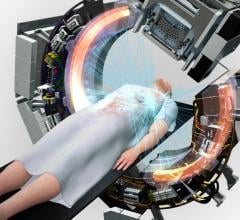December 4, 2008 - A 60-year-old prostate cancer patient from Montpellier has become the first person in France to be treated using RapidArc technology from Varian Medical Systems for fast and precise forms of intensity modulated radiotherapy (IMRT).
Each of his treatments at the CRLC Val D'Aurelle - Paul Lamarque in the city took just 75 seconds, several times faster than conventional IMRT treatments. Dr. Pascal Fenoglietto, the hospital's chief medical physicist for scientific projects, presented the case to colleagues at the annual meeting of the French Society of Radiation Oncologists (SFRO).
"The treatments went extremely well and the patient was very pleased because compared to conventional IMRT it was three times quicker," Dr. Fenoglietto said. "We are now able to use the time we save on treatment delivery to take more images and increase the quality of our care."
"The radiation therapists were also very pleased because it is a simpler treatment for them to deliver," added Professor Jean-Bernard Dubois, head of the radiation oncology department and managing director of the hospital.
With RapidArc, Varian's Clinac medical linear accelerator can target radiation beams at a tumor while making one continuous rotation around the patient. Conventional IMRT treatments are slower and more difficult for radiotherapy radiographers because they target tumors using a complex sequence of fixed beams from multiple angles.
For more information: www.varian.com
RapidArc technology allows more control to conform the dose more closely to the size, shape, and location of the tumor. Faster treatment also contributes to precision by reducing the time for motion within the anatomy, and laboratory studies suggest that faster dose delivery kills cancer cells more effectively. "With this technology we have the opportunity to improve outcomes while offering more patients greater access to advanced care," Dr. Fenoglietto said. "We're excited to be the first hospital in France and the fourth in Europe to offer this treatment to patients."
The hospital, one of the seven members of Varian's RapidArc Council of pioneering centers that helped develop the clinical use of the new treatment technology, carried out the treatment on one of the four Varian linear accelerators in the department using French-language treatment planning and oncology information management software. More than 700 patients have been treated with IMRT at the comprehensive cancer center since its introduction in 2001 and there are plans to replace all conventional IMRT treatments for tumors in the pelvic region with RapidArc treatments.
According to radiation oncologist Dr. Carmen Llacer Moscardo, "Pelvic cases can take between 12 and 14 minutes to treat with IMRT but we can now do them in under two minutes with one arc or, if clinically relevant, about three minutes with two arcs around the patient with RapidArc. If we do this, there is less possibility for the patient to move and we reduce the chance of internal motion playing a part, as there tends to be a lot of motion in the pelvic region. Also, fast treatments reduce the possibility of inaccuracy and increase patient comfort."
RapidArc delivers a volumetric intensity-modulated radiation therapy treatment in a single or multiple arcs of the treatment machine around the patient and makes it possible to deliver advanced image-guided IMRT two to eight times faster than is possible with conventional IMRT. Radiotherapy studies correlate the ability to spare more healthy tissue with reduced complications and better outcomes.


 July 09, 2024
July 09, 2024 








